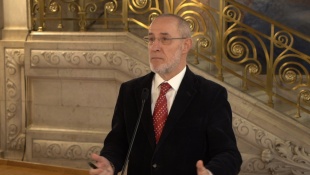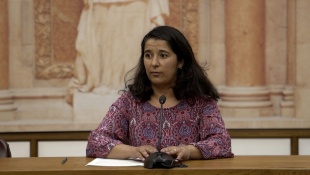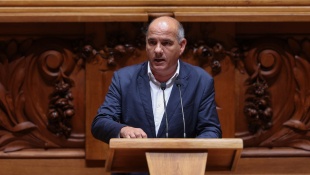On this last day for submitting proposals for amendments to the State Budget for 2026, there is a preliminary issue that needs to be addressed, lest it be forgotten once again. The State Budget for 2026 cannot ignore the tragedy of the forest fires that ravaged the country this summer. The diagnosis has been made, and what needs to be done to prevent and combat fires has been clearly identified. This requires investment in forests that cannot continue to be postponed as it has been until now.
In this budgetary process, the PCP proposes the creation of a National Forest Defence and Valorisation Programme, with €100 million in funding allocated for the implementation of specific measures, including: the development and maintenance of 75% of the primary network of fuel management strips for next year; the implementation of the National Controlled Fire Programme; the creation of forest firefighting teams to reach the target of 500 teams; measures to speed up the implementation of the land registry; reforestation with native species or the promotion of permanent crops. In addition, support for land clearing, aimed in particular at small forest owners and common lands.
Today, we are also submitting a set of proposals in the social areas, with the aim of improving social protection and support and reducing the prices of essential goods and services. Life has become more expensive, families' purchasing power has not been properly valorised, difficulties are growing, and this requires an increase in wages and pensions, as proposed by the PCP, but it is also necessary to strengthen social support.
In education, with the aim of ensuring equal access and success at school, the PCP proposes strengthening School Social Action in compulsory schooling and pre-school education, namely by increasing support for school materials, free meals, school trips and workbooks, continuing the path started by the PCP with free school textbooks. In higher education, we propose broadening the criteria for awarding scholarships to cover more students and increasing the sums awarded to scholarships. We also propose strengthening investment in student accommodation, with a view to having an additional 30,000 public beds over the next three years.
The universality of child allowance has yet to be restored. Child allowance is a child's right. We propose restoring the universality of child allowance and increasing the brackets in order to raise the amounts allocated.
Ensuring the rights of children from an early age should be a national priority. One of the fundamental aspects for children's development is the extension of maternity and paternity leave to 210 days, paid at 100%. The bond created between the father and mother and the baby in the first months of life is essential for its healthy development.
Access to prostheses, glasses and hearing aids is an integral part of the right to healthcare, particularly in childhood, but not only. We are well aware that they often reach prices that are unaffordable, particularly for users with lower incomes. To ensure access for all to glasses and lenses, prostheses and hearing aids, the PCP proposes subsidising them for users with incomes of up to around €1,300 (2.5 IAS Social Support Index).
In Portugal, people are increasingly working until later in life. This represents a significant step backwards, which is why we propose setting the retirement age at 65, with the aim of creating decent conditions for those who have worked their entire lives. Those who have contributed for 40 years should be able to retire without any penalty. This is the focus of the PCP's proposal, with the aim of valorising long contributory careers.
In addition to the 5% increase in pensions with at least €75 already proposed by the PCP to boost the purchasing power of pensioners, the PCP proposes increasing the solidarity supplement for the elderly by €75, raising it to €705 and extending its payment from 12 to 14 months.
The Country is currently facing a glaring shortage of residential facilities for the elderly. Investment is needed to create a public network of nursing homes. We propose the creation of 80,000 places by 2029, with a third of the total number of places to be created in the first two years.
The Social Inclusion Benefit falls short of the needs of people with disabilities. We propose increasing it by around €75, setting it at €400.
Combating the high cost of living requires courage to stand up to the interests of economic groups. The PCP proposes the creation of a price control regime for food products, which have risen particularly sharply in recent years. Life shows that it is not enough to tinker with VAT. It is necessary to move forward, as is the case with other goods (such as medicines or electricity), to determine and set reference prices for each product, based on actual costs and a non-speculative margin.
Just this week, it was reported that the amount of bank fees charged up to September rose to €1.926 billion. Most bank fees are completely unjustified and are a key factor in the formidable profits made by banks, at the expense of workers and pensioners. We propose banning fees for maintaining current accounts and for withdrawing cash at the counter, as well as extending access to basic banking services.
With the aim of improving mobility and encouraging the use of public transport, we propose the creation of an Interregional Intermodal Pass to connect metropolitan areas to neighbouring regions, with a maximum cost of €50. For example, there are people who live in municipalities in the District of Leiria and work in Lisbon, or people who live in Braga and work in Porto, who have to have more than one pass, with increased costs for their journeys. The PCP's proposal ensures intermodality and facilitates user mobility.
The PCP's intervention at this stage of the budgetary process was intense and diverse, with the submission of more than 500 proposals that point to an alternative course for the Country. These proposals break with the criteria accepted by the PSD/CDS, IL, Chega and PS, which are marked by favouritism towards big capital and submission to external impositions, reflected in choices that divert billions of euros of public resources to economic groups and lead to the deterioration of public investment and services.
Proposals that, as a whole, point to an alternative course for the Country in key areas: from wages to pensions; from fiscal justice to strengthening public services; from investment in public facilities and infrastructure to boosting domestic production; from the right to housing to enhancing the National Health Service; from price controls to improving social benefits; from the rights of children and youth, and people with disabilities, to improving the living conditions of the elderly. These are the proposals for which we will fight.


